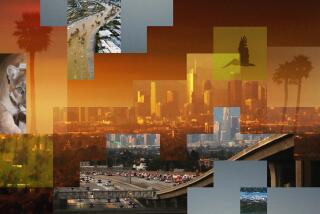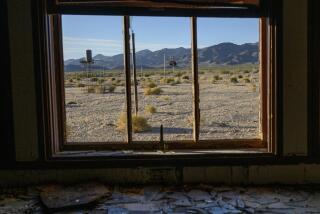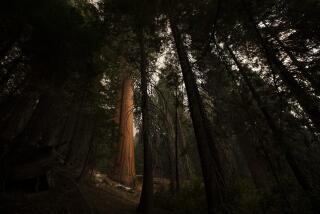Global Warming Is Expected to Be the Hot Issue of 1990s : Environment: Some scientists studying the greenhouse effect say the sky is falling. Others believe the best advice is to stay cool.
- Share via
In a simpler time, not so long ago, environmentalists talked about saving forests for hiking, streams for rafting and clean air for the pure enjoyment of breathing it.
Now, as the 1990s approach, the talk has turned to the science of survival--saving forests for oxygen, keeping streams from spreading toxic pollutants, cleaning the air to avoid catastrophic global warming.
From the hazy vantage point of 1989, the environment looms as the major global issue of the next decade. The threat of environmental cataclysm is replacing nuclear holocaust as the most frightening menace to civilization.
The World Bank, long dismissed by environmentalists as ecologically insensitive, now calls the environment its leading priority for the 1990s. President Bush called the ‘90s “the era for clean air.”
And the Worldwatch Institute, an environmental research organization, calls the ‘90s “the turnaround decade” in which people will either stop polluting or face an environmental disaster as devastating as nuclear war.
“By many measures, time is running out,” Worldwatch warned in its “State of the World 1989” report.
Not everyone shares Worldwatch’s apocalyptic vision, which is based largely on the threat of global warming--the “greenhouse effect.” Many respected scientists say the available evidence does not warrant the doomsday warnings.
But few doubt that environmental issues will be paramount in the coming years. If nothing else, the ‘90s are likely to be a decade of unprecedented research into environmental problems as scientists try to solve 19th- and 20th-Century problems before people start mucking up the 21st.
The environmental agenda in the ‘90s will include:
* Clean air. Perhaps no environmental issue will be as sharply felt. In Los Angeles, authorities will try to change a way of life by starting to wean commuters off gasoline-powered automobiles. The rest of the nation undoubtedly will follow that lead. Already, a congressional committee has voted to adopt California’s tough new standards for anti-pollution equipment on cars.
Ozone depletion. in cities, ozone is a toxic pollutant spewed out by cars, but high in the atmosphere it is a vital gas shielding the Earth from dangerous ultraviolet rays. That shield is being destroyed by yet another human pollutant--chlorofluorocarbons--and the consequences are expected to include increased rates of skin cancer and cataracts.
Extinction of species. Largely because of the destruction of tropical rain forests, entire species of animals, plants and insects are becoming extinct at the fastest rate in human history.
All these concerns will be secondary, however, to the one overriding issue that touches them all--global warming.
The greenhouse theory has been around for two centuries, but suddenly became the stuff of newspaper headlines during the hot, dry summer of 1988 in the United States.
The idea is that certain gases in the atmosphere act like the glass on a greenhouse. They let sunlight in, but won’t let its heat out. The biggest villain is carbon dioxide, which is released when trees are destroyed and when fossil fuels such as oil or coal are burned.
Scientists almost universally agree that the gases will cause the Earth to get warmer. “The greenhouse effect is not a hypothesis or anything; it’s one of the best-established facts about the way the world works,” said Gus Steth, president of the World Resources Institute.
But that’s where the agreement ends; the fights begin when experts try to guess when the warming will occur and how bad it will be.
Some, such as Stephen Schneider, deputy director of the National Center for Atmospheric Research, argue that the greenhouse effect has already begun and will have devastating effects in the next century unless radical action is taken.
Without such action, Schneider envisions a starkly different world by the middle of the next century, one in which the average global temperature will have risen by as much as nine degrees Fahrenheit.
Oceans would rise, deserts would spread, forests would die. People would starve.
“Such a change,” Schneider wrote recently in Scientific American magazine, “would be unprecedented in human history; it would match the (nine-degree) warming since the peak of the last Ice Age 18,000 years ago but would take effect between 10 and 100 times faster.”
It is too late to stop the warming altogether, Schneider argues, but the worst of it could be averted if people cut back drastically in their use of fossil fuels and stopped destroying the rain forests.
Other scientists believe such warnings are premature.
Richard Lindzen, a meteorology professor at the Massachusetts Institute of Technology, argues that climate scientists are operating in a vacuum, not a greenhouse. He said they lack the facts to back up claims about global warming.
“You know very well we can’t predict the weather with any certainty,” Lindzen said with a chuckle.
His forecast for the ‘90s: continued scientific fogginess with a chance of clearing by the end of the decade.
Schneider’s forecast is considerably more ominous.
“Six of the warmest years in the last 100 occurred in the ‘80s,” he said recently at a meeting of chemists in Miami. “And I’ll give you odds that the ‘90s will be warmer than the ‘80s.”
That sort of prognosticating doesn’t impress the greenhouse skeptics.
“Nobody in their right mind would make a forecast like that,” said Andrew Solow, a climate statistician at the Woods Hole Oceanographic Institution in Massachusetts. “There’s just no way you can make that claim.”
Solow said he has pored over the statistics and cannot find any basis for claims that the greenhouse effect has begun. The warmer temperatures in the 1980s, he believes, are probably part of a natural upswing; the greenhouse effect could be centuries off.
What if the heat continues, if temperature records continue to topple through the 1990s, if Schneider’s forecast comes true? Would he become a believer then?
“I’d be pretty convinced,” Solow said.
BACKGROUND The greenhouse effect theory has been around for two centuries, but it suddenly started making headlines during the hot, dry summer of 1988. The idea is that certain gases in the atmosphere act like the glass on a greenhouse. They let sunlight in, but won’t let its heat out. The biggest villain is carbon dioxide, which is released when fossil fuels such as oil or coal are burned.






